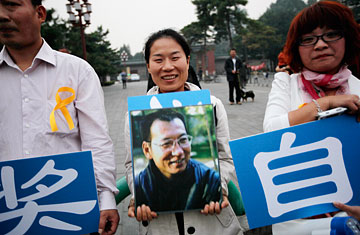
Supporters of Nobel Peace Prize winner Liu Xiaobo gather outside a park in Beijing on Oct. 8, 2010
After imprisoned Chinese scholar Liu Xiaobo won the Nobel Peace Prize last week, this joke began to make the rounds of Chinese-language Twitter users: "I don't know who this Mr. Liu is, but as a Chinese, I'm very happy for a fellow citizen to win the Nobel Prize. He must be one of our great party members, a great official ... and a great leader who does great deeds for his people."
Liu, or course, is neither an official nor a Communist Party member. He is a literary critic and a leader of the 1989 demonstrations in Beijing that were crushed by the Chinese military. In 2008 he co-authored Charter 08, a manifesto calling for broad political reforms in China. In the eyes of the Chinese government, he is a criminal, and he is now serving an 11-year sentence at a prison in northeast China for "inciting subversion of state power" in connection with Charter 08 and other essays he wrote.
His wife Liu Xia was allowed to meet with him on Sunday, Oct. 10, one day after Liu learned from his jailers that he had won this year's prize. When Liu talked with his wife, he broke down in tears and said the "award is for the Tiananmen martyrs," according to Freedom Now, a human-rights group that works to free political prisoners. Liu Xia has since been placed under house arrest herself; her phone is turned off, and she is unable to receive visitors at her Beijing apartment.
Just as Liu Xiaobo learned of his Nobel Prize a day late, Chinese citizens now face a gap in learning about who he is — and why he was chosen. State media outlets initially offered only the briefest report, which quoted a Chinese Foreign Ministry spokesman who called Liu a criminal and said his award was "a blasphemy of the Peace Prize." On Sunday, the state-run Xinhua news service quoted extensively from a report by RIA Novosti, the Russian state-owned news service, which denounced the Nobel Peace Prize as a "political tool." The Global Times, a tabloid sharing ownership with the Communist Party–run People's Daily, published a scathing attack on the Nobel Peace Prize over the weekend. "Good-hearted Chinese people have reason to suspect that the Nobel Peace Prize has been reduced to serve the political tool of Western interests," the paper wrote in an editorial. "The people who manipulate this award are unwilling to see China's peace and unity and hope that political differences will lead to endless political strife in Chinese society, causing a Soviet-style breakup."
On Chinese blogs and bulletin boards, Liu's name has largely been blocked, although news of the Nobel has slipped through in some places. For the first few hours after the prize was announced, it was widely discussed on the Twitter-like service Sina Weibo before administrators began to delete posts with Liu's name. The popular young Chinese writer Han Han simply posted " " on his blog, presumably in reference to the widespread censorship. On Douban, a Chinese website where users discuss films, music and books, one post asking who had heard of "LXB" got 50-some responses. That included a half-dozen people who admitted they hadn't heard of him until the Nobel but were able to look up his background online. The thread was deleted 16 minutes after it was started.
In Beijing, police showed a similar intolerance for a meeting of Liu Xiaobo supporters, who met at a park on Friday, laminated cards depicting a glum-looking Liu hanging from their necks. Once the news of his award was announced, they flipped the cards to reveal a photo of a happier Liu. They then went to a nearby restaurant to celebrate. "Everyone was happy and laughing," says Paul Mooney, an American freelance writer who attended the gathering. Soon after, about 40 police officers entered and, after a brief argument, dragged everyone out. Of 17 people taken away, three remain in detention, Mooney says, citing He Yang, a documentarian who was detained and released.
So far, the government's reaction has been fairly typical, says Nicholas Bequelin, a Hong Kong–based researcher for Human Rights Watch. "Putting dissidents under surveillance, censoring the Internet — none of this is out of the ordinary. It's business as usual," he says. "But after the top leaders take a decision, that's when we will see Beijing's real reaction to this crisis."
— With reporting by Chengcheng Jiang and Jessie Jiang / Beijing
